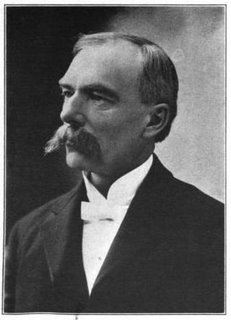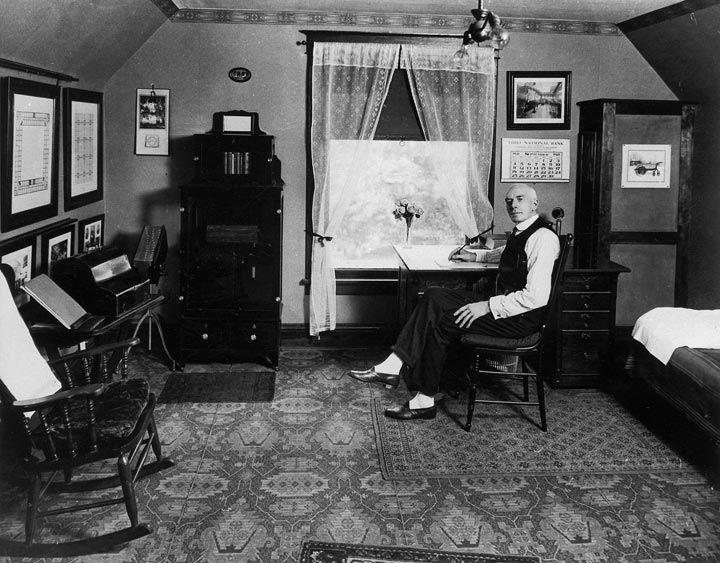A Cityless and Countryless World
An Outline of Practical Co-Operative Individualism
Henry Olerich
[A condensed and edited version of the book
originally published
by Gilmore & Olerich, Holstein, Iowa, 1893 / Introduction]
What follows is the edited and condensed text
of Henry Olerich's remarkable case for the transformation of
societies under principles of cooperative individualism, as he
defined this term. In the original text, Olerich uses the
vehicle of a visitor from another, more advanced planet,
interviewed on earth, who describes the how beings on his planet
solved the socio-political problems that continued to plague the
people of earth. I have edited the text to remove the narrative
while retaining Olerich's essential points. The reader is
directed to the original version to experience the full dramatic
effect of the author's presentation. [Edward J. Dodson - August,
2007]
|


ONE who is not totally blind and insensible to our present conditions
and to the passing events, can see at a glance that mankind in nearly
all its activities is still harassed by detestable friction. It is
true that we have made wonderful achievements in our so-called
sciences. Intelligence as a whole has ever broadened and deepened. We
have photographed stars too remote to be seen even with the most
powerful telescopes. We have weighed the planets and have ascertained
their distances. We have ascended into the clouds beyond the reach of
the naked eye. We have explored the bottom of the sea and have
examined the deep strata of the earth s crust. Our cities are
illuminated with a continuous flash of lightning. Architectural skill
has erected colossal structures which it has splendidly finished and
gorgeously decorated with the hand of art. By the telegraph and
telephone we have almost annihilated time and space. In the phonograph
we have impressed a voice on the mineral kingdom. On the floating
palace of the ocean we can, in a few days, migrate from one continent
to the other. We journey in comfortable, speedy trains. Wonderful
agricultural implements till the soil. Manufacturing and mining have
developed to gigantic industries. The expansive force of steam and the
electric current turn our ponderous wheels of toil. Everywhere
progress is visible. The food, clothing, shelter and luxuries of the
masses are, no doubt, better now than they were ever before in the
history of the human race. Mental activity is bolder, broader and
freer. Fights, quarrels, paternalism and monopoly are gradually
diminishing.
But notwithstanding all this, there is still room for vast
improvement; and one who has the real interest of himself and
companions at heart will not close his eyes against existing evils. He
will boldly and fearlessly face them, and endeavor to diminish them by
a diffusion of a higher and wider intelligence.
A thoughtful observer can not wend his way in any direction but what
he is still confronted by abominable evils which are still preying on
the purity, well-being and happiness of mankind.
In our cities we meet countless men, women and children with pale
faces, who are starving for want of sunshine, pure air and out-door
exercise. Thousands of industrious persons are forced idlers.
Thousands are living in hovels and garrets unfit for a human abode.
Thousands are paupers and tramps. A countless army of men, women and
children are mere machines, working a long, toilsome day in a mill,
factory, or workshop. A large class of women, in order to make a
livelihood, are selling themselves into marriage, or for other vile
purposes. Our farmers are largely spending their lives in country
solitudes, toiling principally for the capitalist and landlord.
A vast multitude, in fact nearly all of our so-called laborers, are
toiling so hard and so long daily, for their mere material subsistence
that little, if any, energy is left for personal cleanliness and
mental culture. Our land tenure monopolizes the earth's surface. Our
medium of exchange which is rapidly concentrating wealth offers
special privileges to the rich. Our system of education is largely
cruel, unnatural and otherwise injurious. Husband and wife, parent and
child, often quarrel and fight and sometimes kill each other and
commit suicide.
Our government is largely invasive and despotic, and principally run
by politicians, who are grossly ignorant of the psychological
principles of human nature. Children, on the one hand, are neglected
and starving, both physically and mentally; and, on the other hand,
they are tyrants and little more than grown-up babies. Care and sorrow
are stamped upon nearly every brow one meets. Mothers, as a rule, are
maternal slaves, feeble and care-worn. Strife, revenge and jealousy
are absorbing a large share of our best energies. Much of our labor is
unproductive and destructive, and most of our machinery, tools and
means of transportation are manipulated in the interest of the rich.
Paternalism stunts individuality, and monopoly prevents the masses
from becoming prosperous.
It is a well-known fact that a stupid, ignorant person, unlike an
intelligent one, can bear most any burden without being galled by it.
Hence all our present agitations, dissatisfactions and utterances of
discontent are only so many tongues that are beginning to speak by the
force of a rising intelligence and an increasing sensibility, which
causes the victims slowly to become conscious of their unjust burdens.
It is, no doubt, true that, as a whole, we have been and are still
gradually marching toward individual freedom and equity, but, as. we
have seen, are still far from having attained them. Some of us have at
last learned that happiness of self includes the happiness of others,
and that our conscious efforts, guided by the highest intelligence,
may be made to count in promo ting this progressive march. For these
reasons I have concluded to contribute my infinitesimal part of this
conscious work of progress by outlining, in these printed pages, a
social and economic system from which, I believe, our existing evils
are eliminated; and to still further assist in this labor, I compare
this new system with our present one, so as to make the work more
perspicuous for those who are not much accustomed to think for
themselves. I also name and describe some of the successive steps of
progress which slowly succeeded one another.
In this work I shall further endeavor to show that social and
economic prosperity and harmony can be attained only in a system which
recognizes extensive voluntary co-operation as its fundamental
principle of production and distribution, and which concedes to every
individual the right to do as he wills, provided he does not infringe
the equal right of any other person; for in the harmonious and
intelligent union of these two factors consists the solution of the
social and economic problem.
I am well aware that my work will meet with strong opposition from my
timid contemporaries. I am aware that they will endeavor to spread the
alarm that this book is dangerous, but such a course is nothing new
and nothing strange. Persons whose hearts are cold and full of
iniquity have never been able to see and feel beyond the very limited
sphere of their own activity They measure all other people by their
own crude and wicked intentions. Cruelty and blind zeal have always
led such persons on unwise paths. Countless examples may be cited in
support of this proposition.
Socrates was accused of corrupting the youth, and was, therefore,
condemned to drink the poisonous hemlock. Jesus, who advocated nobler
and purer principles than His contemporaries, was crucified by them.
Washington, who believed in a republic which concedes a little more
individual freedom than a monarchy does, was branded a traitor by his
monarchical contemporaries. Garrison, who advocated the liberation of
chattel slaves, was denounced a dangerous demagogue. When Luther added
a degree of personal liberty to the inflexible creed of his time, all
Christendom branded him a heretic; a subverter of human well-being.
Haeckel, Huxley, Spencer, Darwin, Bucket, Pentecost, Tucker and
countless others, who have vastly enriched the storehouse of human
knowledge by their genius and industry, have all, in their turn, been
calumniated and denounced by persons who have, perhaps, never read a
line of what these leading men have written.
I do not make these remarks concerning criticism on the ground that I
fear that my work will not bear analysis and examination; but, on the
contrary, I kindly invite the keenest critics to subject the contents
of it to the closest scrutiny. I am keenly conscious that this book,
like all others that have ever been written, contains errors and
shortcomings. To assert the contrary implies perfection, and no person
who is ordinarily well-informed will claim to be perfect or
infallible; but I can afford to invite criticism, for I shall be as
much interested in having my errors and shortcomings pointed out as my
critics are, for I have no creed, no party and no organization to
defend, but am merely searching for truth, and truth needs no other
defense than that of discovering it.
Now let me state right here that I do not wish to be understood that
the masses, who are now living, are suited, as they are at present
constituted, to enjoy and become members of a social and economic
system as pure, high and noble as the one rudely outlined in this
work; but the aim of this work is to fit that vast multitude who are
still unfit for it by having them mentally assimilate some of the
facts expressed and suggested in it, for let us not forget that
man-made institutions are, as a whole, always nearly suited to the
mental capacity of the masses. A comparison of the minds and
institutions of the savage with those of the more developed will
substantiate this great principle. Improve the mind by unfolding it,
and the human-made institutions will improve to correspond.
Let me here advise the reader not to omit any chapter or read them in
any other order than the one given in the book. It is not a fact, as
many believe, that a single topic can be successfully learned or
discussed without having it closely connected with others. For
examples, a change in a locomotive implies or produces a change in the
roadbed, in commerce, in speed, in mercantile business. A change in
the land tenure and in the medium of exchange produces corresponding
changes in all other human institutions and conduct; if not, one land
tenure and medium of exchange would be as good as another. A change in
sex-relations is accompanied with a corresponding change in dress,
food, dwellings, education, modes of travel, amusements, individual
freedom, in the manner of rearing offspring, and in countless other
ways. A system, in order to be natural and harmonious, must be a
connected whole. Hence we can see at once that the very act of
endeavoring to learn or discuss a single topic unconnected with others
is a sign of mental incompleteness.
With these prefatory remarks, I humbly submit the following pages to
the thoughtful consideration and impartial judgment of a continuously
progressing individual.
CONTENTS
|